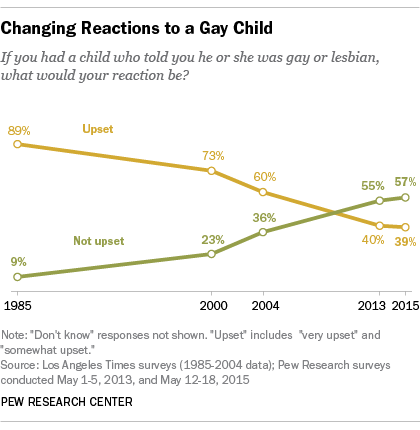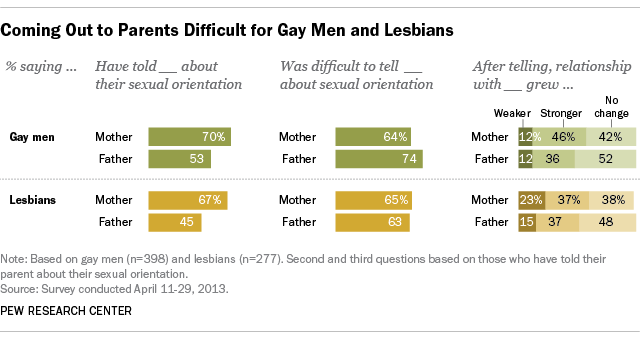The Supreme Court decision last week legalizing gay marriage nationwide came with growing public support over the past decade. But the support for gays and lesbians to wed legally is a reminder of how Americans’ acceptance of homosexuality has also grown dramatically.
 Three decades ago, most Americans felt it would be troubling to have a child tell them he or she was gay: In a 1985 Los Angeles Times survey, nine-in-ten American adults (89%) said they would be upset if this happened, and just 9% said they would not be.
Three decades ago, most Americans felt it would be troubling to have a child tell them he or she was gay: In a 1985 Los Angeles Times survey, nine-in-ten American adults (89%) said they would be upset if this happened, and just 9% said they would not be.
But views of homosexuality have shifted over time, and today nearly six-in-ten (57%) say they would not be upset if they had a child come out as gay or lesbian, according to a Pew Research Center survey conducted in May.
The change in attitudes toward having a gay child reflects broader shifts in views of homosexuality. More than six-in-ten Americans (63%) now say homosexuality should be accepted by society, compared with 46% in July 1994, according to the same May poll. In 1994, 49% of the public said society should discourage homosexuality.
Millennials are the least likely to say they would be upset (29%) if their child told them he or she was gay or lesbian. But the older the respondents, the more likely they are to say the moment would be a difficult one: 36% of Gen Xers say they would be upset, as would 47% of Boomers and 55% of Silents.
The question on learning a child is gay or lesbian is largely hypothetical (it was asked of adults with children and without), and this is especially true for Millennials. The oldest Millennial today is 34 years old, and our 2013 survey of LGBT Americans found that the median age for coming out to a family member or close friend was 20.
An important milestone for many gay men and lesbians is telling their parents about their sexual orientation, our 2013 survey showed. Overall, gay adults are more likely to have shared this information with their mothers (70% in the case of gay men, 67% in the case of lesbians) than with their fathers (53% gay men, 45% lesbians).
 The majority of gay adults who did end up telling their parents said it was hard to do. Among those who told their mothers, 64% of gay men and 65% of lesbians said it was difficult; and among those who told their fathers, 74% of gay men and 63% of lesbians said it was difficult.
The majority of gay adults who did end up telling their parents said it was hard to do. Among those who told their mothers, 64% of gay men and 65% of lesbians said it was difficult; and among those who told their fathers, 74% of gay men and 63% of lesbians said it was difficult.
LGBT respondents who said in our 2013 survey that they had not told their parents about their sexual orientation or gender identity were asked in an open-ended question, “Why not?” Two main reasons emerged: 1) Some felt it was not important to tell their parent, or the subject never came up; and 2) some assumed their parent would not be accepting or understanding of this, or they worried about how it would affect their relationship with their parent.
Most gay men and lesbians who told their parents about their sexual orientation, however, said their relationship with that parent either grew stronger afterward or stayed the same, while very few said their relationship weakened.
Read more about LGBT Americans’ coming out experience, in their own words.


